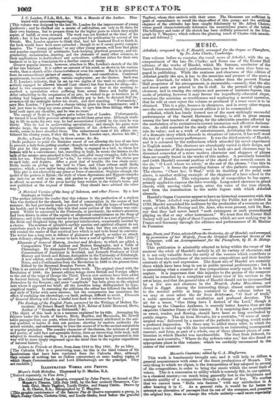MUSIC.
Athaliah; composed by G. F. Handel; arranged for the Organ or Pianoforte, by Dr. John Clarke, Ca dye.
THE volume before us contains the vocal score of Athaliah, with the ac- companiment of the late Dr. Clarke; and forms one of the Exeter Halt editions of the works of Handel, which Mr. Surman, conductor of the, Sacred Harmonic Society's performances, has now for some time been en- gaged in publishing. While the neatness and clearness of this edition of Athaliah gratify the eye, it has to the musician and peruser of the score a. serious drawback, for which Dr. Clarke, rather than the present Exeter 'Hall proprietor of his arrangements, is answerable,—namely, that the alto and tenor parts are printed in the G cleff. In the perusal of eight-part choruses, and in tracing the subjects and answers of intricate fugues, this, mode of printing, however it may favour the imperfectly-educated singer, occasions the musician so troublesome and unpleasing a mental operation, that he will at once reject the volume so produced if a truer score is to be obtained. This is a pity, because in cheapness, and in every other respect save the one mentioned, the present edition is to be commended.
Athaliah, which has lately formed one of the most strikingly successful performances of the Sacred Harmonic Society, is still in great esteem, among the best teachers of singing, for the admirable practice afforded by the modulation of its recitativesincorrect intonation and effective declama- tion. As solid material for the study of the solo-singer, it will over main- tain its value; and as a work of entertainment, developing the movement of a dramatic story which abounds in situations of interest, it has well stood the test of a continuous performance. It was the third oratorio of Handel; and it is coloured by the enthusiasm which attended his novel experiment in English music. The choruses are abundantly varied in their design, and in the character of their expression; and in both airs and choruses may be discerned somewhat of a more modern character and elegance of phrase. than are usually found in the works of this author. A peculiarly beautiful and (with Handel) unusual position of the chord of the seventh occurs in the air, " 0 Lord, whom we adore," at the end of the phrase, " Can this be thy decree ": it forms the prevailing feature of this pathetic composition. The chorus, " Cheer her, 0 Baal," with its doubling of the pedal note, above, is another striking example of the elegance of a later school in the• writings of Handel. This voluptuous style of composition he has appro- priately appliedto express the false worship. Long-noted choruses in grand chords, with moving violin parts, utter the voice of the true church, and form the introduction to the noble fugues with which Athalials abounds.
Handel's Organ Concertos appear to have an historical connexion with this, work. When Athaliah was performed during the Public Act at Oxford in 1733, Handel astonished his audience by the production of a concerto on the organ, of which Mr. Fasting and Dr. Ame, who were present, told Dr. Bur- ney that they had never heard "such extempore or such premeditated' playing on that or any other instrument." We trust that the Exeter Hall Society will not lose sight of these Concertos, which are now making way in France and Germany through the editions and performances of M. Monier de Fontaine.


























 Previous page
Previous page